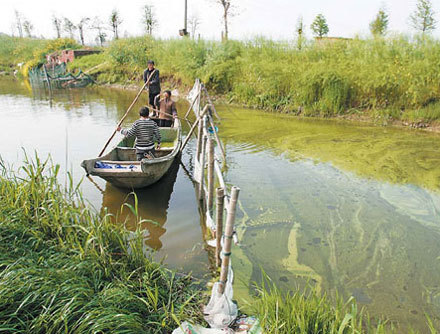Last February, 58 year-old pig farmer Xie Pandi was told by local authorities in Guangyi County of suburban Wuxi that she could no longer raise pigs as she had done for the past 20 years - for environmental reasons.
 |
|
Villagers in Yixing, Jiangsu province, clean algae from a stream leading into Taihu Lake. |
It seemed that the manure from her pigs was polluting nearby rivers which fed into Taihu Lake. With the help of her two sisters, Xie simply moved her 100 pigs to a village further north in hopes of stretching the rules for one more year. But she knows that the jig is up.
As part of its commitment to environmental protection, China's government is now focusing on the nation's vast rural areas, which include communities such as Xie's.
"I can see the tide changing now," Xie said. "Pig-raising is not welcomed, even in this remote corner. It won't be long before they ask me to stop again."
Xie has reason to worry. The village is preparing to lay underground pipes for household wastewater collection and treatment, a sign that environmental protection is starting to take on momentum in the countryside.
Although uncertain about her future, Xie understands that her life is likely to change as environmental protection measures are no longer negotiable and will impact everyone.
"Another pig farmer I know has started working at a local factory," Xie said.
She is nevertheless shrewd enough to point out other sources of pollution, which have yet to be addressed.
"I heard pollutants from factories producing chemical fertilizers cause even more serious damage than pig manure when they flow into ditches and rivers," Xie said. "Why doesn't the government do something about that?"
Qin Boqiang of the Chinese Academy of Sciences' Nanjing Institute of Geography and Limnology would agree. Nitrogen and sulphur from chemical fertilizers are mainly to blame for the eutrophication of Taihu Lake, yet the problem has not received adequate attention, Qin said. The government has also not made an all-out effort to crack down on industrial pollution, he added.
China also faces environmental problems caused by the relocation of industries to suburban and rural areas where environmental standards are lax. The relocation of these industries bring secondary sources of pollution, especially when rural areas do not have adequate treatment facilities, Qin said.
Xie and her neighbors in Guangyi County have witnessed such occurrences for the last five years.
Tucked in the northeastern corner of Wuxi, the county experienced a continuous influx of manufacturing businesses because of its cheap land and labor costs. Today, an impressive cluster of small private enterprises can be seen dotting the green paddy fields.
According to Xie, pollutants from these factories have been discharged directly into nearby rivers, turning the water turbid.
Last year, the local government began to take stringent measures to clean up the environment. Factory owners have had to either comply or shut down.
For example, Bao Zhiqiang, who is known as "Boss Bao," can now only revel in the memory of the good old days when he was owner of a paint factory with annual sales revenue of more than 100,000 yuan. His 500 sq m warehouse used to be filled with different paint products. Today, there is nothing except a few motorcycles left in the empty dilapidated warehouse.
"I can't do manufacturing any more," Bao said. "I'm thinking of doing becoming a paint dealer, or simply renting out the warehouse."
The Wuxi Nanzhaizhuang Food Co. Ltd, a local snack food producer specializing in salted spareribs and roast fish is only 200 meters away. The local government has required the factory to install its own wastewater treatment system. The cost of 180,000 yuan cut deeply into the factory's earnings, according to staff member Zhu Wei.
"We do not purposefully discharge wastewater into the river, but there is simply no sewer pipe in the area," Zhu said. "It is a good sign that companies are willing to spend money on wastewater treatment, but it's definitely a big burden and not everyone can afford it."
"We hope the government can do more to improve the infrastructure so that we can work together to curb pollution, " he added.
At its first national environmental protection meeting for rural areas last month, the State Council made it clear that the first objective is to ensure safe drinking water and construction of sewage treatment facilities.
There are 300 million farmers who do not have access to safe drinking water, and 80 percent of the rural areas do not have sewage treatment facilities, according to Professor Zheng Zheng of Nanjing University's Environmental Protection Department.
The government's new green crusade is aiming for a 10 percent increase in sewage and wastewater treatment capacity by 2010 in rural areas.
(China Daily September 3, 2008)